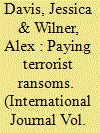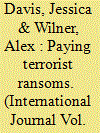|
|
|
Sort Order |
|
|
|
Items / Page
|
|
|
|
|
|
|
| Srl | Item |
| 1 |
ID:
120439


|
|
|
|
|
| Publication |
2013.
|
| Summary/Abstract |
Female suicide bombers are increasingly seen in conflicts throughout the world; in recent years, they have become much more prevalent in religious-fundamentalist conflict. Specifically, global jihadist groups are increasingly incorporating female suicide bombers into their operations, a significant ideological and operational shift for most of these groups. Jihadist groups are using women to fill a recruiting void, to achieve tactical surprise, and for strategic purposes. Female suicide bombers are likely to emerge in jihadist conflicts throughout the world, from Nigeria to Pakistan and beyond.
|
|
|
|
|
|
|
|
|
|
|
|
|
|
|
|
| 2 |
ID:
188905


|
|
|
|
|
| Summary/Abstract |
Terrorist groups are believed to be financed, in part, by ransoms paid for kidnap victims. As part of global efforts to counter the financing of terrorism and prevent further terrorist attacks (including more kidnappings), the international community has attempted to implement a moratorium on the payment of ransoms. Despite a unified stance, ransom payments to terrorist groups have continued. An exploratory review of 20 countries reveals significant variation between public statements and private practice when it comes to ransom payments. While it is clear that states, organizations, and individuals are paying terrorist ransoms, it is far less clear what effect this has had on terrorism itself. A review of three case studies shows significant variation in the relationship (or perhaps, lack thereof) between ransom payments and terrorist attacks. These findings suggest a need for more study on the effects of ransom payments on terrorist capabilities, and a re-assessment of existing “no-ransom” policies.
|
|
|
|
|
|
|
|
|
|
|
|
|
|
|
|
| 3 |
ID:
188915


|
|
|
|
|
| Summary/Abstract |
Terrorist groups are believed to be financed, in part, by ransoms paid for kidnap victims. As part of global efforts to counter the financing of terrorism and prevent further terrorist attacks (including more kidnappings), the international community has attempted to implement a moratorium on the payment of ransoms. Despite a unified stance, ransom payments to terrorist groups have continued. An exploratory review of 20 countries reveals significant variation between public statements and private practice when it comes to ransom payments. While it is clear that states, organizations, and individuals are paying terrorist ransoms, it is far less clear what effect this has had on terrorism itself. A review of three case studies shows significant variation in the relationship (or perhaps, lack thereof) between ransom payments and terrorist attacks. These findings suggest a need for more study on the effects of ransom payments on terrorist capabilities, and a re-assessment of existing “no-ransom” policies.
|
|
|
|
|
|
|
|
|
|
|
|
|
|
|
|
|
|
|
|
|